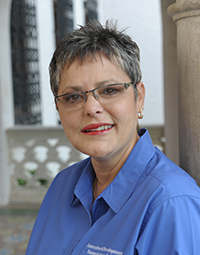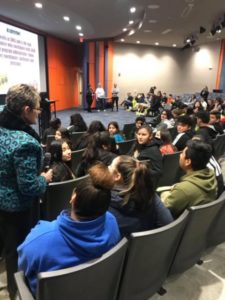• by Nilka Avilés, Ed.D. • IDRA Newsletter • May 2019 •
 The platitude “College is not for everyone” often elicits nods of agreement. Typically– even altruistically – the sentiment refers to certain groups of students and serves as a veiled excuse not to prepare students for college. Underpreparation clearly hurts the students and their families and has broad implications for community well-being.
The platitude “College is not for everyone” often elicits nods of agreement. Typically– even altruistically – the sentiment refers to certain groups of students and serves as a veiled excuse not to prepare students for college. Underpreparation clearly hurts the students and their families and has broad implications for community well-being.
Schools that take successful steps to overcome old prejudices make the institution the locus of change. Barriers disappear when educators recognize all students as college material and take steps to make it so.
We have strong historical examples of success: With the GI Bill, the Latino community witnessed on a large scale the dispelling of the myth of un-educability. World War II veterans attended college, and their children gained social mobility from the economic benefits of their newly degreed parents. Most of the teachers of these future veterans had not predicted post-secondary success.
Students can succeed when they have support from educators committed to the same goal and who actively prepare students and remove barriers. Some Texas school districts, such as Pharr-San Juan-Alamo ISD and Roscoe ISD, model the premise that college and post-secondary education is for everyone (Bojorquez, 2014). This article describes key characteristics of college-focused K-12 schools.
Elements of Success – Expectations and Support
Effective solutions require mindsets that create an environment of high expectations. Transformation comes from recognizing all students as college material. Successful schools shift systematic adaptations toward personalized instruction. They deliver rigor in content through a range of pedagogical approaches, including genuine support systems.
Real-world career exposures supplement lectures and use of traditional textbook-based instruction. Educators can monitor progress and provide genuine academic, social and emotional support. For each student, there must be an educator who understands the student as a whole person and acts as an advocate to ensure the student’s success.
Elements of Success – School Culture

IDRA senior education associate, Dr. Nilka Avilés, facilitated a leadership day event with tutors from San Antonio ISD in the IDRA Coca-Cola Valued Youth Program. The event was held at the University of Texas at San Antonio with college faculty and special activities to help the young students connect with life on a college campus.
A transformed school provides support beyond traditional academic pedagogy. The school culture celebrates diversity, and activities incorporate students’ family cultures and funds of knowledge. Such schools provide classes, workshops and other venues for highlighting the diverse groups represented in the student body.
College-focused teachers integrate socio-cultural supports in classroom assignments, project-based learning activities and schoolwide events. Activities involving home language, history and culture remove barriers and reduce students’ isolation and sense of not-belonging. Creative educators convert traditional activities into rigorous projects that both strengthen students’ self-concepts and expand their academic skills.
Elements of Success – Counseling and Advising
College-focused K-12 schools deliver authentic counseling. They expand counselor roles and distribute “counselor-mentor” tasks to teachers and other educators. Educators assist each student with college preparation choices, career and professions options, and the practical mechanics of applying to college. In many cases, school leaders must re-program impractical counselor-student ratios so that students receive personal, authentic advising.
Elements of Success – Instruction
Students perform impressively when their school focuses on developing the cognitive and affective competencies needed to excel. Educators are able to serve the whole student, considering social and emotional learning while also maintaining content rigor so that students acquire the content and skills necessary for college success.
In these schools, teachers teach differently, with a wide array of pedagogical approaches. They arrange their classrooms flexibly and, rather than following textbooks linearly, they open up instruction to project-based learning through real-world experiences. These can include site visits, professional shadowing, role models, demonstrations and job internships. Dynamic, engaged learning replaces the traditional process of reading to answer the questions at the end of the chapter.
Administrators and teachers in college-focused schools intentionally investigate and plan how to deliver curriculum and instruction in ways that ensure rigor, high expectations and college readiness for every student. With mutually-agreed upon action frameworks, teachers can structure the intended outcomes and delineate accountability. This accountability includes keeping students in school as well as assisting students to succeed academically, socially and emotionally.
As educators modify their teaching, they also tend to expand their communication and outreach methods. Model schools use authentic outreach and personal communication to effectively inform students and families about college preparation and opportunities. And as seen in IDRA’s family leadership process, they work in partnership with families and students to develop a college vision for their students (Montemayor, 2016).
Elements of Success – Post-secondary Connections
Just as secondary schools must modify how they educate and prepare students for college, colleges must change as well. In this new mindset, colleges can work together with secondary schools to facilitate academic preparation, admission procedures and registration processes.
Lecture halls with hundreds of students passively listening to orations by professors or teaching assistants must give way to more personalized and effective pedagogy. Students need individual academic and social support. And financial support is critical to supplementing the income of economically-disadvantaged students so that their work schedules are not barriers to their schoolwork.
Students can succeed when they have support from educators committed to the same goal and who actively prepare students and remove barriers.
Effective colleges develop systems that ensure positive, personal and trusting relationships with students by faculty and staff. As in secondary schools, college staff need to assist students to navigate the system, which is a new and unfamiliar environment, especially for first-time enrollees. Just as extended counseling-mentoring structures are effective in middle and high schools, research shows that college students need the same supports.
Although the challenges might be greater in post-secondary settings, the faculty must build positive relationships with students to support academic success. First-generation college goers often need support specifically for the necessary knowledge, finances, and college processes.
Both public schools and colleges benefit from partnering with local community organizations for needed outreach, family engagement support, mentoring, after-school programming, mental health awareness and future career planning through conversations with students and their parents.
Federal resources are available, but they are limited. TRIO programs are federally-funded college opportunity programs that support students from disadvantaged backgrounds in their pursuit of a college degree. Although those monies are very limited now, clear evidence shows that such programs address the challenges that post-secondary education presents to students.
Early-college programs specifically have proven effective in supporting students to excel academically to be ready for college and to foster behaviors and conditions necessary for college completion (Avilés & Garza, 2010).
In K-12 schools, the mindset must be: “Every student is college bound.” This mindset is alive when each student has access to college-preparation classes with the necessary supports for success. It is alive when each student has a circle of support with at least one designated mentor to navigate course choices, college application and overall success. Educators at all levels support each student along the critical path into college. Once in college, the institution continues to provide comparable support to the students.
The goal is that every public school student graduates prepared for college. With deliberate action, many college-focused schools are already proving that college is for everyone.
Resources
Avilés, N., & Garza, E. (2010). Early College High School: A Model of Success for High School Redesign. International Journal of Urban Educational Leadership.
Bojorquez, H. (2014). College Bound and Determined. Intercultural Development Research Association.
Edmunds, J.A., Arshavsky, N., Lewis, K., Thrift, B., Unlu, F., & Furey, J. (2017). Preparing Students for College: Lessons Learned from the Early College. NASSP Bulletin.
Montemayor, A.M. (September 2016). Co-Leading and Co-Transforming Schools – School Administrators and Family Leaders in Education. IDRA Newsletter.
Stuart Wells. A. (2009). Closing the Achievement Gap by Providing Poor and Minority Students Access to Suburban Schools. Teachers College.
Nilka Avilés, Ed.D., is an IDRA senior education associate and co-directs IDRA’s Re-Energize project. Comments and questions may be directed to her via email at nilka.aviles@idra.org.
[©2019, IDRA. This article originally appeared in the May 2019 IDRA Newsletter by the Intercultural Development Research Association. Permission to reproduce this article is granted provided the article is reprinted in its entirety and proper credit is given to IDRA and the author.]


